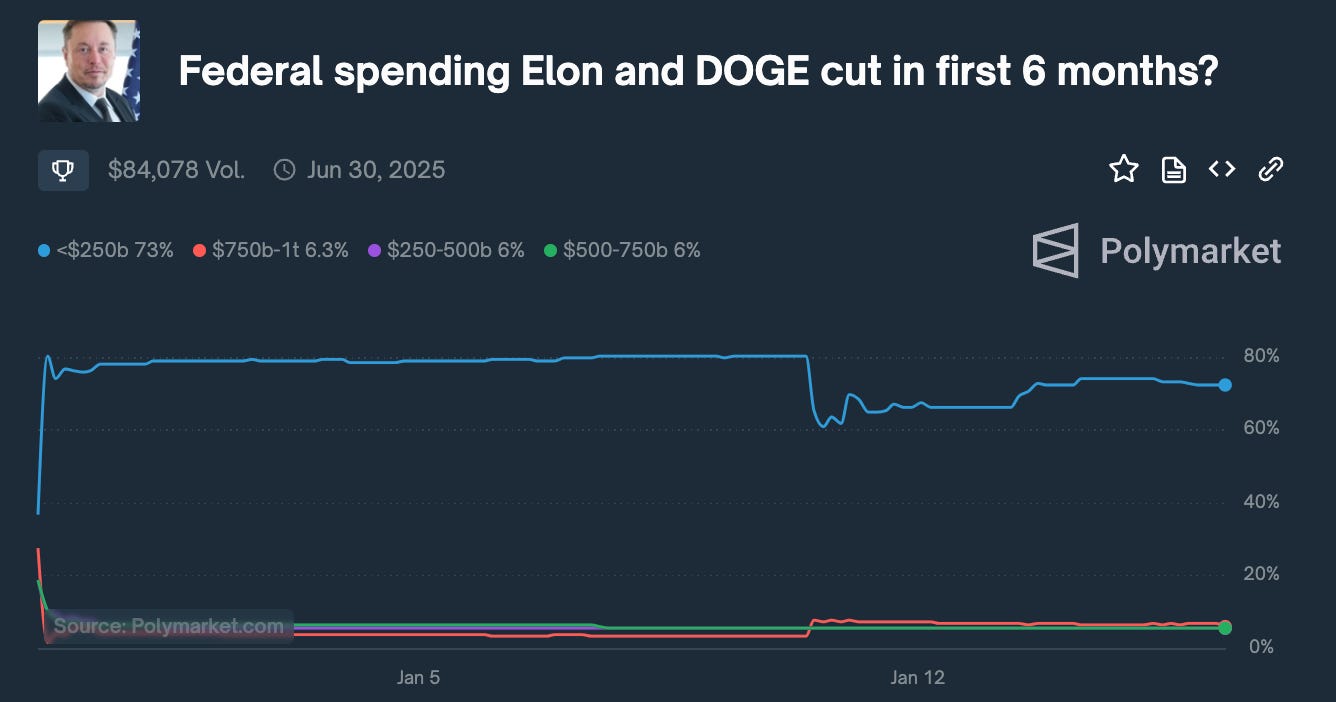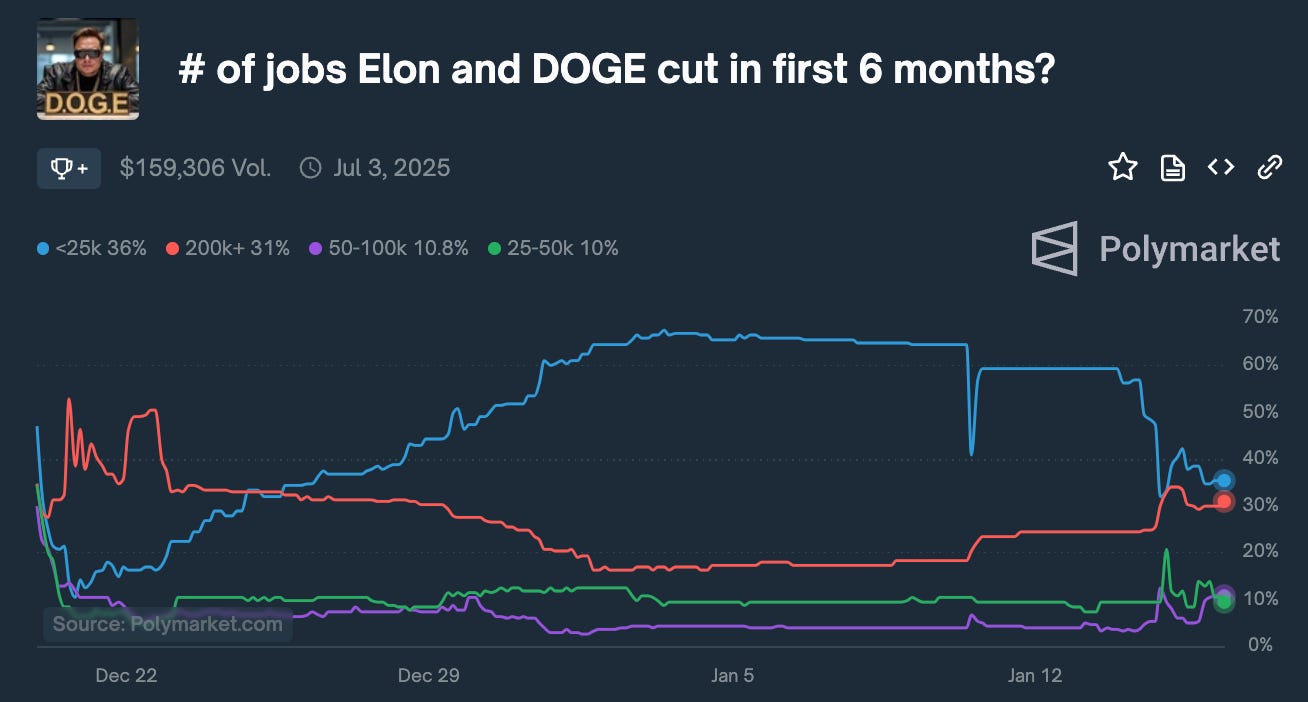🔮 DC vs. DOGE
An Open Investigation, Powered by Prediction Markets
The Department of Government Efficiency, or DOGE is unique in the history of US bureaucracy.
DOGE is planned as a temporary organization that will have no institutional power, but a massive megaphone in the form of Elon Musk’s X. It is being staffed by Silicon Valley types, not DC insiders, and has set a goal to cut up to 29% of US federal spending.
Critics point out the irony of creating a new org to cut others, and the fact that the new entity is being run in part by the owner of Tesla and SpaceX, which are major beneficiaries of federal spending. And they note that the Federal budget largely goes to healthcare, pensions, and defense - areas that would be legally tricky or political suicide to cut.
For all these reasons, DOGE is shaping up to be a central feature of Trump’s second term, and one that is uniquely suited to prediction markets.
Today, we are launching an open-ended investigation into DOGE, where we use Polymarket to track forecasts of the organization’s impact. If you are interested in contributing to this project, we’re looking for writers and researchers: details here.
Today’s article looks at current market expectations for DOGE, and open questions for future research.
What Markets Say
Slow Start Expected
DOGE is unique among government bodies in that it is time-limited, with an expiration date of July 4, 2026 set in the initial announcement. On Polymarket, DOGE markets cover the first six months of Trump’s term, and, so far, odds are 73% that DOGE will cut $250b or less of federal spending.
This is the lowest bracket – just under 4% of the federal budget. Perhaps the market is expecting a ramp up later in Trump’s term, but for now it appears that the initial cuts will be in the ballpark of past budget deals, for example:
The 2011 Budget Control Act cut ~$1.2 trillion over 10 years (~$120B per year)
The 1993 deficit reduction package cut ~$433 billion over 5 years
Cuts of ~$250b in the first year would put DOGE on a similar scale as past budget deals, but still far short of the $2 trillion target. In recent comments, Musk has walked back this goal, but the market is still pricing in a significant gap between target and reality:
Reductions in Force
The market for the number of federal jobs cut by DOGE in the first six months has moved in recent days. In this market there is a split distribution, indicating the market sees either a “boom” or “bust” scenario as most likely:
Low Scenario: Under 25k jobs cut ( ~1% of federal workforce): 🔮 36% odds (down from 60s in early Jan)
High Scenario: Over 200k jobs cut ( ~7% of federal workforce): 🔮31% odds (up from the 20s)
Musk and Ramaswamy have said the reductions in federal jobs will be commensurate with cuts in regulations, and would be broad, perhaps even randomized, “reductions in force” rather than targeting specific agencies or job categories.
Vivek to Senate?
The initial plan for DOGE was to have it be separate from the federal government, existing as a loose network of Signal groups, and without any formal legal entity. But in recent days, reports have emerged that Trump is encouraging Vivek Ramaswamy to accept the appointment to the Ohio senate seat left vacant by JD Vance.
Ramaswamy is still an underdog to get the senate seat (🔮33% odds) and had initially removed himself from consideration to focus on DOGE. It remains to be seen whether a senate seat would be a distraction from the DOGE work, or an accelerant:
“Certain Agencies to be Deleted Outright”
Another early promise of DOGE is the full-scale elimination of government agencies. Currently the only market on Polymarket that tracks this is “Will Trump end the Department of Education.”
The market, which runs through the first 100 days of Trump’s term, is only pricing a 5% chance it happens.
Odds are better that Vivek (🔮27%) or Elon (🔮 22%) will be out at DOGE by summer than the DOE – the target of Republican presidents dating back to Reagan – is fully eliminated.
Open Questions
With anywhere from 4%-30% of government spending on the line, DOGE is a big priority for the Trump administration, and Polymarket’s current markets only scratch the surface of its impact. Some other open questions we will be investigating:
F-35 Cuts? Elon Musk has called builders of the F-35 “idiots” and insisted that manned fighter jets are on the way out, to be replaced with drone swarms. But with contracts spread across 307 congressional districts and 45 states, can the DOGE cut through bureaucracy this thick?
Stock Market Impact. Major government contractors are already feeling the bite. Large contractors have already lost 25% in market value since the announcement of DOGE on November 12. However it is unclear how the policies will affect them; past waves of federal government cuts have actually led to increased contracting, for example the decline in NASA launches and rise of SpaceX.
What Agencies Bear the Brunt? DOGE’s X account has been combing through records to highlight wasteful government spending. So far, these have focused on DEI, and foreign aid programs, both a tiny fraction of federal spending. Can DOGE take a real bite out of entitlements, military, or other politically sensitive programs, or fulfill its promise of eliminating agencies wholesale?
DC Real Estate Market. DC media outlets have warned federal cuts could hit the local housing market especially hard, leading to a “regional recession for housing.” Can prediction markets forecast the geographic distribution of these job cuts?
Connect With The Oracle
Tips? Feedback? Story ideas? Write oracle@polymarket.com or @wasabiboat on X
Connect On X: Follow The Oracle on X for breaking news updates
Write for The Oracle: We’re expanding our coverage and looking to hire more writers and investigators. Details Here.
Disclaimer
Nothing in The Oracle is financial, investment, legal or any other type of professional advice. Anything provided in any newsletter is for informational purposes only and is not meant to be an endorsement of any type of activity or any particular market or product. Terms of Service on polymarket.com prohibit US persons and persons from certain other jurisdictions from using Polymarket to trade, although data and information is viewable globally.









